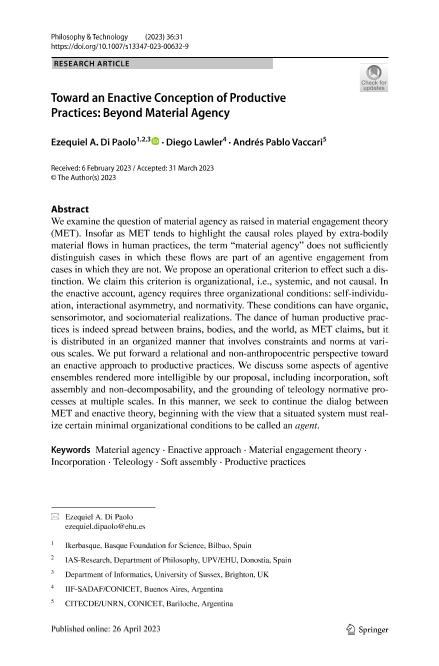Mostrar el registro sencillo del ítem
dc.contributor.author
Di Paolo, Ezequiel
dc.contributor.author
Lawler, Diego

dc.contributor.author
Vaccari, Andrés

dc.date.available
2024-03-05T10:56:51Z
dc.date.issued
2023-04
dc.identifier.citation
Di Paolo, Ezequiel; Lawler, Diego; Vaccari, Andrés; Toward an Enactive Conception of Productive Practices: Beyond Material Agency; Springer; Philosophy and Technology; 36; 2; 4-2023; 1-11
dc.identifier.issn
2210-5441
dc.identifier.uri
http://hdl.handle.net/11336/229306
dc.description.abstract
We examine the question of material agency as raised in material engagement theory (MET). Insofar as MET tends to highlight the causal roles played by extra-bodily material flows in human practices, the term “material agency” does not sufficiently distinguish cases in which these flows are part of an agentive engagement from cases in which they are not. We propose an operational criterion to effect such a distinction. We claim this criterion is organizational, i.e., systemic, and not causal. In the enactive account, agency requires three organizational conditions: self-individuation, interactional asymmetry, and normativity. These conditions can have organic, sensorimotor, and sociomaterial realizations. The dance of human productive practices is indeed spread between brains, bodies, and the world, as MET claims, but it is distributed in an organized manner that involves constraints and norms at various scales. We put forward a relational and non-anthropocentric perspective toward an enactive approach to productive practices. We discuss some aspects of agentive ensembles rendered more intelligible by our proposal, including incorporation, soft assembly and non-decomposability, and the grounding of teleology normative processes at multiple scales. In this manner, we seek to continue the dialog between MET and enactive theory, beginning with the view that a situated system must realize certain minimal organizational conditions to be called an agent.
dc.format
application/pdf
dc.language.iso
eng
dc.publisher
Springer

dc.rights
info:eu-repo/semantics/openAccess
dc.rights.uri
https://creativecommons.org/licenses/by-nc-sa/2.5/ar/
dc.subject
AGENCY
dc.subject
MATERIAL ENGAGEMENT THEORY
dc.subject
PRODUCTIVE PRACTICE
dc.subject
ENACTIVISM
dc.subject.classification
Otras Filosofía, Étnica y Religión

dc.subject.classification
Filosofía, Ética y Religión

dc.subject.classification
HUMANIDADES

dc.title
Toward an Enactive Conception of Productive Practices: Beyond Material Agency
dc.type
info:eu-repo/semantics/article
dc.type
info:ar-repo/semantics/artículo
dc.type
info:eu-repo/semantics/publishedVersion
dc.date.updated
2024-02-29T13:19:52Z
dc.journal.volume
36
dc.journal.number
2
dc.journal.pagination
1-11
dc.journal.pais
Suiza

dc.journal.ciudad
Berna
dc.description.fil
Fil: Di Paolo, Ezequiel. Universidad del País Vasco; España. University of Sussex; Reino Unido
dc.description.fil
Fil: Lawler, Diego. Consejo Nacional de Investigaciones Científicas y Técnicas. Oficina de Coordinación Administrativa Parque Centenario. Instituto de Investigaciones Filosóficas. - Sociedad Argentina de Análisis Filosófico. Instituto de Investigaciones Filosóficas; Argentina
dc.description.fil
Fil: Vaccari, Andrés. Universidad Nacional de Río Negro. Sede Andina. Centro de Estudios en Ciencia, Tecnología, Cultura y Desarrollo; Argentina. Consejo Nacional de Investigaciones Científicas y Técnicas; Argentina
dc.journal.title
Philosophy and Technology
dc.relation.alternativeid
info:eu-repo/semantics/altIdentifier/url/https://link.springer.com/article/10.1007/s13347-023-00632-9
dc.relation.alternativeid
info:eu-repo/semantics/altIdentifier/doi/http://dx.doi.org/10.1007/s13347-023-00632-9
Archivos asociados
